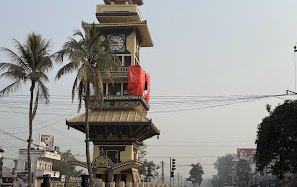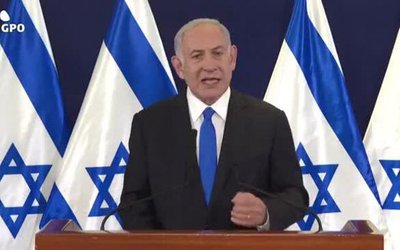
Officials at the Ministry of Commerce are waiting to get the invitation from the Ministry of Foreign Affairs to sign the revised Transit Treaty before January 5, 2013, alongside their Indian counterparts. However, the Ministry of Foreign Affairs, which has expressed its reservation on the provision of One Time Lock (OTL), seems to be in no hurry.
“We are waiting for the response from the Ministry of Foreign Affairs,” said a senior official of the Ministry of Commerce. “The new treaty has many things which will ultimately be in favor of Nepal.”
Nepal and India have agreed on almost all issues to be incorporated in the revised transit treaty, but the process of finalization has been delayed due to the objection of the Ministry of Foreign Affairs.
Minister for Foreign Affairs Narayankaji Shrestha maintains that the OTL system is against the Bilateral Treaty of Transit and sovereign rights of Nepal. However, India wants to formally incorporate the OTL system in the renewed Treaty of Transit.
India began affixing OTLs on Nepal -bound cargo from third countries via its Kolkata/Haldia ports and vice-versa from August 1, 2011, arguing that Nepal -bound cargo items are often tampered and the locks are found broken. India argues that it is an internationally agreed practice to safeguard the interest of the transit country.
“Technically, affixing the additional One Time Lock system does not seem to be much of an issue but it has now become an emotional matter related to national integrity,” said a senior official at the Ministry of Foreign Affairs. “There is no reason to delay the process.”
Officials at the Ministry of Commerce and Supply said that they have already informed the Prime Minister about the issue. The Prime Minister had assured them he would discuss it with Deputy Prime Minister and Minister for Foreign Affairs Narayan Kaji Shrestha.
The bilateral Treaty of Transit, which has the provision of automatic renewal every seven years, expires on January 5, 2013. Nepal has long been attempting to incorporate new transit routes into the treaty. Failure to revise the bilateral treaty before renewal will affect Nepal's proposal.
“We have already forwarded the letter of exchange to the Foreign Ministry and are waiting to give a formal invitation to India for a revision of the Transit Treaty,” said commerce secretary Lal Mani Joshi.
Major Highlights of the Treaty
India, in principle, has agreed on Nepal’s demand to have access to Vishakapatnam Port and a new transit route to go to Bangladesh. Similarly, Nepal also agreed to incorporate Indian demand to give transit rights to India in Nepal in ferrying the goods from India’s one state to another.
During the revision of the Nepal-India Trade and Transit Treaty, the ministry is looking forward to making agreements on three major issues –– use of Visakhapatnam port, revision of Railway Service Agreement, and access to Rohanpur-Singhdabad Transit Route. “The agreement on Visakhapatnam port will create an alternative route for cargo transportation for Nepal,” said Joshi.
Nepal also reciprocated by agreeing to allow India to use Nepal as transit to go from one state to another. India had been seeking such a facility on reciprocal basis given it has been providing transit facility to Nepal. After the agreement on the revised treaty, Indian trucks will be able to transport goods from one part of India to another part via Nepal’s 27 border points.
Nepal agreed in principle to this effect during bilateral Inter-Governmental Committee (IGC) meeting in New Delhi, India in April 2012. Nepal had been providing such a facility to India on a temporary basis through a government decision whenever floods caused transport disruption in bordering Indian states.
Benefit to Nepal
Nepali officials believe that the transit facility given to India would benefit Nepal as the country can charge fees on Indian cargos such as entry fee in dry port, service charge and road transportation fee. “The biggest advantage for Nepal is that the country will have more bargaining power as it can claim that it has also given something to India,” said a government official involved in the negotiations.
By providing transit route to India, Nepal can maximize the economic benefits from it. One of the benefits is transportation system and the other is infrastructure development in Nepal’s east west corridor. It will not only help Nepal in providing incentives to the farmers and to the rural economies to integrate with the main stream development economics of the country but also help to expanding trade with India’s north eastern state and other states.
Due to conflict at political level, political boundaries tend to become physical barriers to trade. Till now Nepal does not allow India transit access for trade to the North Eastern states. Transport costs of trade for these North Eastern states with western part of India will drastically go down by using east-west corridor of Nepal.
The transit has been a thorny issue in Nepal-India political and economic relations for a long time. So the change in political mindset is a huge step forward.
The benefits of this policy change are obvious and will be advantageous for both Nepal and India. India will gain from much lower transport cost for its own trade and Nepal will benefit from a much better utilization of its road facilities and associated fees.
Despite its geographically advantageous position, Nepal is yet to exploit it for economic prosperity. Bordered with India’s three most populous states of Utter Pradesh, Bihar and West Bengal and two other small states of Uttaranchal and Sikkim, Nepal’s east west road corridor can be used as the shortest point to link India’s western states with northeastern states. Nepal can make immense economic benefits by allowing the use of Nepal’s road corridor to provide transit facility to India for transporting the goods through Nepal.
As the time is running out, Nepal and India will need to sign the agreement before it expires on January 5. Nepal will be a loser in case of failure to incorporate its issue in the revision.

Keshab Poudel
Poudel is the editor of New Spotlight Magazine.
- ERC Nepal Is Focused On Expanding Distribution And Transmission To The Private Sector: ERC Chair Dr. Dhital
- Jul 06, 2025
- FOURTH PROFESSOR Y.N. KHANAL LECTURE: Nepal-China Relations
- Jun 23, 2025
- Colonel JP CROSS: Centenary Birthday
- Jun 23, 2025
- BEEN: Retrofitted For Green
- May 28, 2025
- GGGI has been promoting green growth in Nepal for a decade: Dr. Malle Fofana
- May 21, 2025















